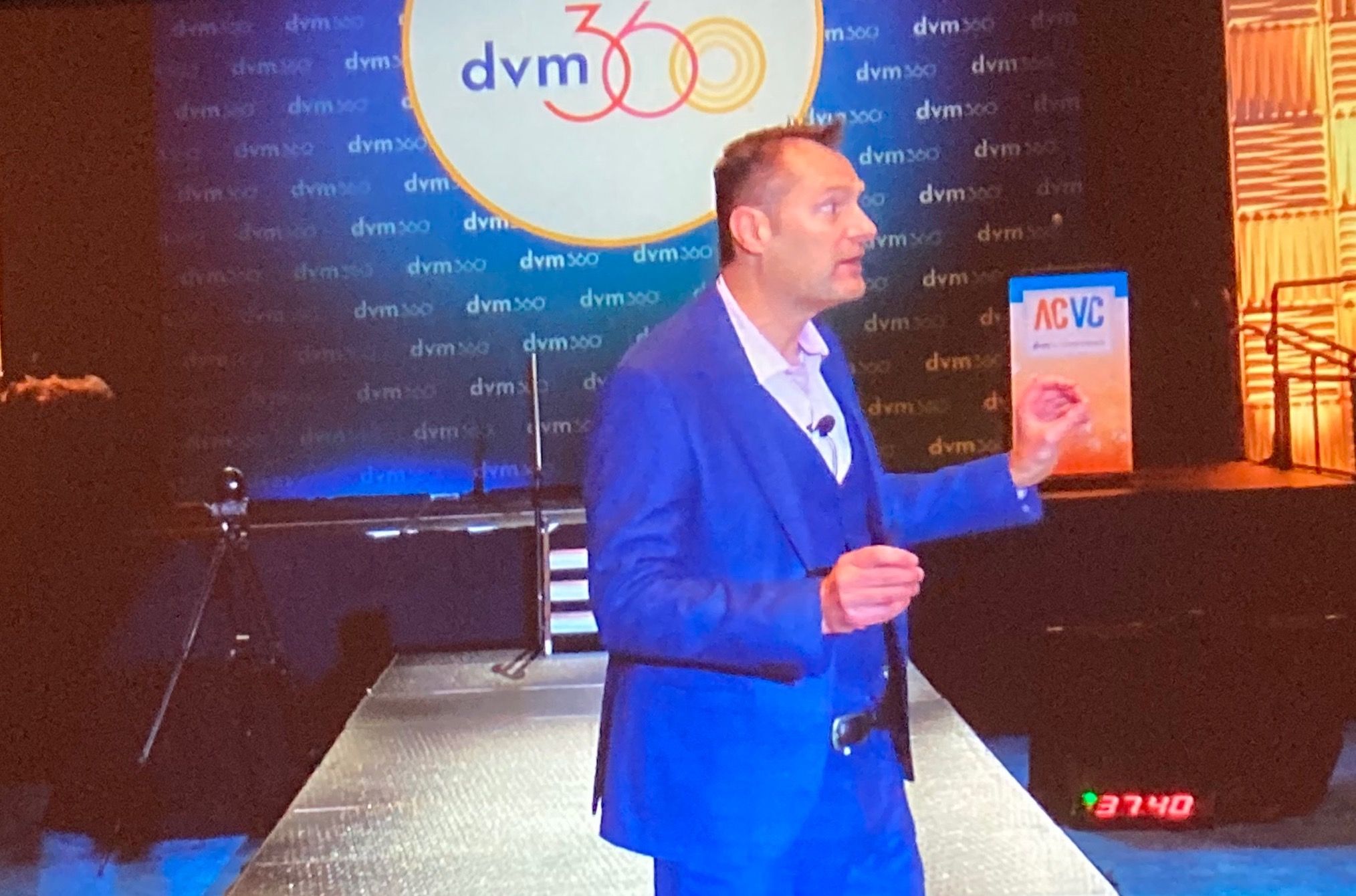The latest and greatest in canine oncology treatment
At the 2022 Atlantic Coast Veterinary Conference, keynote speaker, Craig A. Clifford, DVM, MS, DACVIM (Oncology), outlines the best methods currently available for treating cancer in dogs
The first day of the 2022 Atlantic Coast Veterinary Conference (ACVC), in Atlantic City, New Jersey, kicked off with keynote speaker, Craig A. Clifford, DVM, MS, DACVIM (Oncology), medical oncologist at BluePearl Specialty and Emergency Pet Hospital (Malvern, Pennsylvania) and director of BluePearl Science. He offered an overview of the latest advancements in canine oncology so attendees can further offer patients the best care.1 Clifford emphasized that all the information he shared today is invaluable for all those in general practice, not just specialists.
Dr Craig A. Clifford delivering his keynote address "Recent Advancements in Oncology" at the 2022 Atlantic Coast Veterinary Conference.

ImpriMed chemotherapy sensitive assay
ImpriMed offers chemotherapy sensitive assays via artificial intelligence-(AI) driven, customized cancer drug response predictions in just 7 days with a fine needle aspiration. This means veterinarians can simply submit to ImpriMed a sample from the lymph node of a dog suffering from lymphoma to determine if its T- or B-cell cancer, the drugs the patient will likely respond to, plus the report will include additional useful information. “It’s truly a first step in personalized medicine,” expressed Clifford.
ImpriMed also gets more specific with its findings and creates a graph comparing the average dog’s response to drugs to your patient’s likely response, how soon a patient may have a response, and how long that response may last. For clients with financial restraints, the chemotherapy sensitive assay can also highlight which single drug would be best to use. “This is really cutting-edge type [technology],” Clifford stated.
As versions of this chemotherapy sensitive assay further evolve, the data becomes more accurate. How accurate is the ImpriMed predictor currently? “That’s where we need a prospective study be done, and they are in the process of getting started,” Clifford said. However, from personal experience he has been impressed with its precision.
Laverdia-CA1 (verdinexor tablets)
Laverdia-CA1 is the first oral tablet FDA conditionally approved to treat canine lymphoma. It is in the Selective Inhibitor of Nuclear Export (SINE) class of drugs, which have demonstrated the ability to suppress nuclear factor kappa B (NFκB) activity as one means of inducing tumor cell death.
This drug is to be initially given at 1.25 mg/kg, twice weekly with 3 days between dosages. If tolerated after 2 weeks, depending on clinical response, you can increase the dose to 1.5 mg/kg twice weekly with at least 3 days between doses. If the dog experiences adverse effects, dose reductions of 0.25 mg/kg to a minimum dose of 1 mg/kg per week can be made. Clifford noted that before administering Laverdia-CA1, dogs should be fed. The most common side effects of the drug are gastrointestinal, including loss of appetite and weight loss.
He added that this drug is well absorbed and bioavailable. “[Laverdia-CA1] is more targeted than [chemotherapy], it does have efficacy and is affordable…so it fits within that sweet spot.” Clifford also highlighted a study that found that when pets were on Laverdia-CA1, many owners reported their pets maintained a good quality of life, even when the disease progressed, so they wanted their pets to remain on the drug. This displays that this drug is something “maybe [to not] jump off too quick, it can be one that requires more time.” Plus, it shows it can provide a good middle ground for patients.
OncoK9 liquid biopsy
This PetDx test is a non-invasive, multi-cancer test that can be done by performing a simple blood draw in dogs. OncoK9 offers a novel approach because it enables early detection of cancer, which can help advance treatment results in patients.
To complete this liquid biopsy test, PetDx sends you a special test kit, you collect the sample, send it to the lab, they run next-generation sequencing, and send you results detecting if a pet has cancer with 10-14 days. Clifford shared that OncoK9 only has a 1.5% false positive rate, so it’s very likely the pet has cancer if the test is positive. “This is high-end technology and a high-end platform [PetDx is] using for it.”
This test is especially ideal for those at risk for cancer, including older dogs, those predisposed (eg, Golden Retrievers, Boxers, etc), plus when a cancer site is suspected but challenging to access, and when cancer is suspected but the site is not clinically evident.
OncoK9 doesn’t indicate which type of cancer a dog has, so you still have to perform further diagnostics, but it does offer insight on next steps. Clifford shared that within the next few years, he predicts the test will identify specific genetic signatures for specific cancers.
Reference
Clifford CA. Recent advancements in oncology. Presented at Atlantic Coast Veterinary Conference; Atlantic City, New Jersey. October 10-12, 2022.